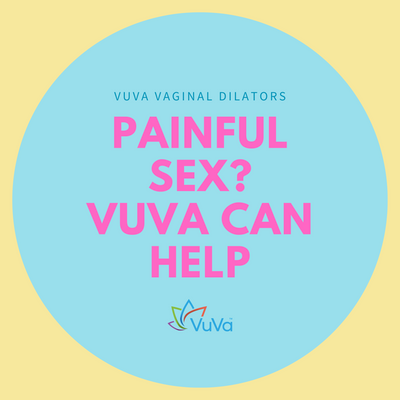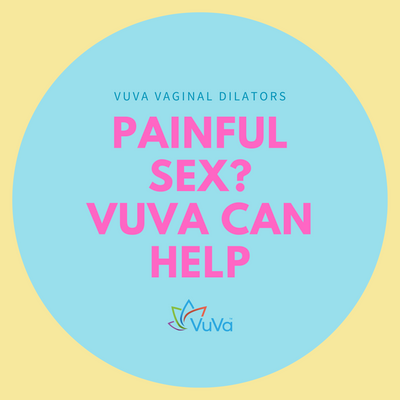
| Tara Langdale
How to Avoid Painful Sex and When to Use Dilator Therapy
Painful penetration is more common than you think and has a significant impact on sexual health. When you have recurring pain during sexual intercourse, pelvic exams, or tampon insertion, you might have a more in-depth medical condition. For some, improving sexual pain might be as simple as using a vaginal moisturizer like a lubricant to help enhance sexual pleasure, but for others, it isn't that simple.
One effective treatment is dilator therapy. Healthcare professionals have been prescribing vaginal dilator therapy to help improve sexual dysfunction for many years. The reason is that it's a proven method for improving sexual function and has a positive impact on female sexuality. But why is this true, and how do dilators treat penetration difficulties?
Vaginal Dilators to Treat Painful Penetration
Many women report significant improvements in sexual activity using vaginal dilators. Vaginal dilators are long tube-shaped devices with tapered ends that help stretch a tight vagina. Our VuVa Magnetic Vaginal Dilator Set comes in different size dilators, starting with ones as small as a pinky finger and increases from there. When you begin dilator therapy, you'll choose the smallest dilator size you can handle, based on your pain threshold. It’s important to start off slow and work up to treatments, one to two times per day.
How Do Vaginal Dilators Treat Painful Penetration?
Some health care providers prescribe medications or surgery to help treat pelvic pain, but these can come with serious side effects. Sometimes the best sexual medicine is the one you wouldn't expect. Vaginal dilators help stretch the pelvic floor muscles in your vagina. When you insert the dilator into the pelvic floor, over time, the muscles begin to soften and spread naturally.
Treating Painful Penetration
The key is to start slowly and be patient. It takes time to improve sexual pain. Some dilators are only medical-grade plastic, and others like the VuVa™ Neodymium Magnetic Dilator have magnets to increase the blood flow to the vagina and calm nerves. Magnet therapy works on the principle that the north side of the attraction allows healing energy to flow into the tight, scarred, or sensitive vaginal tissue.
Dilators Stretch While Balancing
One critical component of blood is iron, and every atom in our cells contains oxygen and produces an electrical impulse. When you pull fresh oxygenated blood into the nerves and surrounding muscles, you help heal them.
While the north side of the magnet helps circulate fresh oxygen, the other side helps to reduce acidity in the body caused by disease, tearing, or treatment. Basically, as a result, magnets create a positive energy field to counteract the acidity and provide alkalinization. In the end, it helps reduce pain associated with painful penetration. If you're looking for female sexual medicine that works, then vaginal dilators are for you.
Dilate or Vibrate?
When you're having pain during sexual activity or when undergoing a pelvic floor physical, your healthcare provider might prescribe vaginal dilators. For some, dilators resemble a vibrator. It's common for some women to consider using a vibrator or dildo to help stretch and lengthen vaginal muscles. While vibrators do help relax muscles and encourage sexual pleasure, using them for vaginal physical therapy is not the intended use. You need a set of graduated dilators to move up to desired size during pelvic floor therapy.
The sole purpose of vaginal dilators in women's health is to ease painful penetration and help you live pain-free. Vibrators intended use is sexual pleasure, and may not be the best option for treating vaginal pain.
Causes of Painful Penetration
There are many health conditions responsible for painful penetration. Reasons range from structural problems to mental health concerns, and many women experience painful intercourse at some point in their lives. Recurrent or ongoing vaginal pain that occurs just before, during, or after sexual activity is dyspareunia or painful sex. The following are medical conditions associated with or cause painful penetration.
Vaginal agenesis
Vaginal agenesis is a rare condition that develops when the vagina and womb (uterus) is only partially intact or not all. This disorder occurs before birth, and may also be associated with other heart, kidney, or skeletal abnormalities. Usually, the discovery of vaginal agenesis happens during puberty or when the woman starts to become sexually active.
Vaginal Stenosis from Radiation Therapy
Vaginal stenosis (VS) is the shortening and narrowing of the vagina. Cancer treatment of vaginal, cervical, uterine, and anorectal cancers often involve pelvic radiation therapy (RT), leading to the common side effect of VS. Most oncologists recognize that VS harms your well-being, including sexual health and comfort during pap smears.
Breast Cancer Treatments
When you have breast cancer, it's common to have chemotherapy and your ovaries physiology to change. The treatment can bring on early-onset menopause more abruptly and reduce the amount of estrogen in your body. Estrogen is a sex hormone responsible for the many functions, but one of them helps lubricate the vagina. The lack of estrogen may cause vaginal atrophy or dryness. Vaginal atrophy may make sexual intercourse uncomfortable or even painful.
Going Through Menopause
Menopause usually affects women in their late 40s and early 50s. Although early-onset menopause may occur earlier either due to a hormonal imbalance or other medical conditions, it signals a time with conception comes to an end. Making this transition may cause painful menopausal symptoms. One of them is vaginal atrophy, resulting in uncomfortable or painful intercourse.
Lichen sclerosus
Lichen sclerosis (LS) is a skin disorder that can affect the anal and genital areas of both men and women. Signs include white spots on the skin, burning sensations, bleeding, and pain. LS may lead to changes in the vulvar anatomy. As a result, the vagina can become narrower, and the tissue may grow thin and develop tears, especially during sexual activity.
The condition may cause acute pain during sexual intercourse, leading to further bleeding and tears. Women may decide to forgo sex altogether.
Vulvodynia
According to the National Vulvodynia Association, Vulvodynia is chronic vulvar pain without a known cause. While some women experience pain in one specific area of their vagina, others have pain in different areas. Including pain, women report a burning or stinging sensation. Sometimes women even claim it’s like “acid being poured on my skin,” and others describe it as “constant knife-like pain.”
Vaginismus
Vaginismus occurs when the genital area is touched or during attempted penetration either through the penis insertion, pelvic exam, or putting in a tampon. The pelvic floor muscles involuntarily contract or spasm, making the activity (sexual or otherwise) impossible and painful.
There are different forms of vaginismus, and the amount of reported pain varies by individual. Several factors affect this condition, including emotional, medical, or both. Without treatment, vaginismus may become worse.
Surviving Painful Penetration
Experiencing painful penetration can lead to emotional and physical problems not only with the women’s anatomy but also for her relationships. Being proactive in finding a solution is crucial for saving relationships and easing the pain. Talking about sex with your partner or therapist may help begin the healing.
Another option, either in conjunction with therapy or by itself, is using a vaginal dilator. Dilator therapy is proven to help ease painful penetration and help women suffering lead the life they deserve. You'll be surprised by how well it works over time and what a safe treatment pelvic dilator therapy is.
Avoiding Painful Sex - Twitter
Dilator therapy helps improve pelvic health and female sexuality. They are used to help a wide variety of female health concerns. Speak to your doctor today about how dilator therapy can help you.
Do you need to order vaginal dilators so you can start your pelvic floor therapy process? Made in the USA. Visit www.vuvatech.com
VuVa Dilator Company Helpful Links:
How do Neodymium Vaginal Dilators work?
7 Reasons for a Tight Vagina and How to Loosen
How to Relax Vaginal Muscles, Vaginismus & Sex
Vaginal Stretching - Keeping in Shape with Dilators
Do Dilators Really Work? Yes, and They can Improve Your Sex Life!
Shop for VuVa Vaginal Dilators
Tara Langdale Schmidt is the inventor of the VuVa Dilator Company. She has pelvic floor dysfunction herself and wanted to create a dilator set that is made in America that women can trust. VuVatech has been in business since 2014 and has helped over 50,000 women all over the globe. She patented the Neodymium Vaginal Dilator, that is clinically proven to help with blood flow and nerve pain.















